Amid a growing backlash against the federal government’s alleged persecution of academics, the federal Attorney General’s Office (FGR) will once again attempt to secure warrants for the arrest of 31 scientists and researchers on corruption charges.
On Wednesday, a judge at the maximum security Altiplano prison once again rejected the FGR’s request for warrants for the arrest of members of the Scientific and Technological Advisory Forum (FCCyT).
The FGR alleges that 31 scientists and researchers who were formerly employed by the National Council of Science and Technology (Conacyt) embezzled public money via the forum, carried out operations with resources of illicit origin, engaged in organized crime and made illicit use of their positions.
Its allegations center on 244 million pesos (US $12.2 million at today’s exchange rate) the FCCyT received from Conacyt during the 2012-18 government led by former president Enrique Peña Nieto.
The FGR argued against the ruling in a statement on Wednesday.
“The district judge points out in his refusal that the private company that Conacyt public servants created, authorized and funded in order to later join, and in which they used federal resources allocated to scientific research to help said company in its purchase of furniture, vehicles [and] properties, [and to pay] salaries and direct services, is not a criminal act because the advisory forum set out in the Conacyt statute authorizes it,” the FGR said.
“That opinion is not acceptable for the federal Attorney General’s Office given that it’s an internal statute issued ad hoc by the Conacyt officials themselves. It can’t go against what is set out in the Science and Technology Law and Conacyt’s own Organic Law, which are obligatory for [officials to follow] and which consider the forum an internal organ of that institution and don’t allow in any way for [the forum] to be turned into a private company that obtains its funds, profits, resources and salaries from public funds allocated to scientific investigation.”
As a result, the FGR said it will once again seek warrants for the arrest of the 31 scientists, among whom are former Conacyt director Enrique Cabrero Mendoza, Julia Tagüeña Parga, a former director of the FCCyT, Gabriela Dutrénit Bielous, a professor at Mexico City’s Autonomous Metropolitan University (UAM), and Luis Mier y Terán Casanueva, a former rector of UAM.
It will be the third time the FGR seeks authorization for their detention.
According to the Associated Press, the FGR has charged the academics with violating a law that prevents members of an advisory board from receiving money from a government science fund. But that law was passed in 2019, the news agency said, and the scientists and researchers – who have denied any wrongdoing – received the funding prior to that.
Numerous members of Mexico’s academic community assert that the FCCyT members are being persecuted.

“In the face of growing concern and anxiety that has emerged among members of the national academic community due to this nonsense, this inconceivable accusation of criminal association, we must protest,” said Enrique Graue, rector of the National Autonomous University (UNAM)
“… this is an attempt to silence voices that are critical of the management of Conacyt. There is no valid element to justify such extreme accusations,” said David Romero, a UNAM researcher.
The Center for Research and Teaching Economics, a Mexico City university, said the accusations against the academics “are simply unacceptable.”
“… For that reason we demand the authorities withdraw this disproportionate and absurd claim,” it said.
Alejandro Frank, a physicist and National Science Award winner, said the “war” the federal government has waged against the academic community since the start of its six-year term is “incomprehensible.”
“This has awakened a feeling of absolute rejection … from a large percentage of the scientific community,” he added.
President López Obrador weighed in on the matter at his news conference on Wednesday.
“It is presumed that there was poor management of resources at Conacyt. But a judge will resolve this and he who owes nothing [should] fear nothing. The thing is we have to combat corruption … from the very top to down below,” he said.
The initial complaint against the FCCyT members was filed by Conacyt director María Elena Álvarez-Buylla, who earlier this year defended her decision to elevate Attorney General Alejandro Gertz Manero to a lucrative and prestigious position among Mexico’s top-level researchers, even though he allegedly plagiarized a thesis he submitted decades ago.
Gertz, a veteran who was appointed to a nine-year term as attorney general in January 2019, asserts that he cited his sources appropriately.
Álvarez-Buylla has also angered academics by criticizing them for presenting reports in English, rather than Spanish, despite the former language being the lingua franca in some technical fields.
The government has also cut funding for science and other academic endeavors, and López Obrador has charged that corruption was allowed to flourish in academia during previous administrations.
